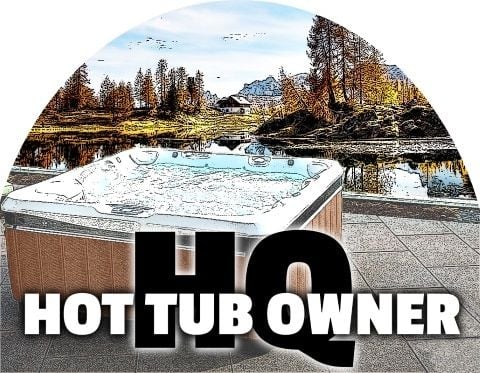There has been increasing interest in saltwater hot tubs in recent years. But using little to no chemicals seems risky. So are salt water hot tubs safe?
Saltwater hot tubs are safe. While they don’t use as much chlorine or bromine sanitizer, hot tub owners do still use those to sanitize and shock the hot tub. The reduction of harsh chemicals combined with the saltwater also is gentler on the skin.
In this article, we compare saltwater tubs to regular types and look at the pros and cons, as well as what to watch out for.
If this is your first hot tub, you need to read this recent article on my site. It tells you all you need to know before deciding which hot tub is best for you.
Just click that link to read it on my site.

Looking to get a quote on a new hot tub?
Save time and receive multiple quotes for hot tubs from all the best-known brands!
I have arranged with BuyerZone.com to provide free quotes from all the best hot tub manufacturers – with no obligation to buy. Simply complete BuyerZone’s request form below.
Are saltwater hot tubs better?
Not necessarily better, but different.
Yes, there are benefits of soaking in salt water, and the feeling of bringing a bit of the ocean to your back yard can be very appealing.
Let’s look one by one, at some of the top benefits a saltwater hot tub can provide:
Saltwater hot tubs cause no unpleasant odor
Let’s face it. Chlorine is pretty harsh. The red eyes and strong smell is something we’re all familiar with. Saltwater hot tubs don’t eliminate the need for chemicals like chlorine or bromine. But you do use a lot less. The result is almost no chemical odor whatsoever.
You’ll save money
As I just explained, saltwater hot tubs use a lot less sanitizer and shock. As a result, you’ll be adding less of those chemicals, and less frequently.
Ultimately, while you’ll have the initial cost of adding a saltwater system to your hot tub like this great one on Amazon, you’ll save a boatload in the long run on ongoing chemical costs.
Improved skin condition
While chlorine can make your skin red, blotchy, and rough like sandpaper, saltwater has the opposite effect!
According to Dr. Sapna Palep, a board-certified dermatologist who works at Spring Street Dermatology, “Board-certified dermatologists are recommending sea salt baths for patients with psoriasis, eczema, and other dry skin conditions.”
So take a saltwater soak! Your skin will love you for it.
Saltwater benefits arthritis
Smoother skin isn’t the only physical benefit from using a saltwater hot tub! No, many arthritis sufferers have seen greatly improved symptoms from regularly soaking in saltwater.
But don’t take my word for it!
In a recent study, researchers at ScienceDirect found that saltwater treatments were “found to be beneficial in rheumatologic diseases, including rheumatoid arthritis, psoriatic arthritis, ankylosing spondylitis, and knee osteoarthritis.”
Want to learn more about how saltwater hot tubs compare to regular ones?
In a recent article, I compared saltwater tubs to regular tubs, so why not check that out on my site. What really surprised me was how easy it is to add a saltwater system; no plumbing knowledge required!
Just click that link to read it on my site.
Hot tub pic.twitter.com/MwEATZaFFJ
— Vintage/Art (@VintageArt7) August 5, 2020
What are the cons of a saltwater hot tub?
First of all, not everyone likes salt.
That said, we compare the amount of salt to what you would find in the ocean. The salinity of seawater is typically 35,000 parts per million (ppm), whereas the level in your hot tub will be around 2,000 to 3,000 ppm. You probably won’t even taste it.
The cost of converting to saltwater can be as much as $500 initially, although it will be much less in most cases. And again, the one I like on Amazon is under $400.
And as I mentioned, this cost will be offset in the long run by savings in buying chlorine and bromine, though.
The saltwater chlorinator must be replaced every two to five years, depending on the make and usage you get out of your tub. Regular maintenance and topping up of salt levels help prolong life and avoid damage to the cell.
Salt is corrosive and can damage metal parts and rubber seals. However, the level of salt is quite low, and mostly decent hot tubs feature non-corrosive materials. After all, they are going to be exposed to the elements for several years.
There is also a risk of damage to linings, underwater lighting, and pumps in older tubs, but this is unlikely in a new bathtub or designed for saltwater.
A ground-fault circuit interrupter (GFCI) is required to run the salt water chlorinator, so if you have a mobile or inflatable hot tub running off 110v, you may need an electrician to wire this up for you. There is more on this in a recent article on my site.
Just click the link to read it.
Worried that a hot tub will be too much work? Discover the maintenance benefits of a salt water system. #CalderaSpas https://t.co/id2oflJ1um pic.twitter.com/txUyoa7zBi
— Caldera® Spas (@CalderaSpas) September 26, 2019
Is soaking in saltwater good for you?
I got into some of the benefits above. But yes; most people agree that soaking in saltwater is beneficial.
But in a hot tub, you must use a specific saltwater generator. You can’t just toss in salt!
Some people like to use Epsom salts in a bathtub because it helps them relax. That’s fine, but you should never use Epsom salts in your hot tub! Go through this recent article on my site to understand why.
There is a lot of medical evidence supporting the use of salt in water. Soaking in it helps moisturize the skin, and it can relieve conditions such as psoriasis or eczema and ease redness, according to WebMD.
Salt is an anti-microbial, so it can block unwanted germs from entering your body and force bacterial liquids out, according to Science Focus.
Check out how salt water hot tubs compare with traditional chlorine spas in this article by Caldera Spas! https://t.co/yZEOR1dJcL#hottub #calderaspas #saltwater #compare pic.twitter.com/eodjyouQu1
— Prisco Hot Tubs (@priscom1) June 12, 2020
Do saltwater hot tubs use chlorine?
Saltwater generators convert salt into chlorine. They just use a lot less of it than when you were pouring chlorine granules into your hot tub.
That being said, you will most likely find yourself still occasionally adding chlorine sanitizer or shock to maintain safe soaking levels. This is especially true after the hot tub is seeing heavy use.
How does the saltwater system convert salt into chlorine?
A small electrical current passes through this cell, which creates the chlorine from the salt in the water.
You can get these kits on Amazon, such as this one by ContolOMatic, for under $400. Just click that link to see the current price on Amazon.
The chlorine created is a natural by-product of the process and is, therefore, less harmful than the chlorine used in pools and spas. Users of saltwater hot tubs often comment on how much softer the water is and how gentle it is on the skin.
Apart from the natural odor, there will be no smell in saltwater because of no added chlorine. The chloramines present in it, cause the bad smell you sometimes get when you lift the lid.
The salt used must be additive-free food-grade, not table salt or rock salt. This salt is available from many suppliers and is quite inexpensive.
You can order Aquasalt on Amazon for around $25 for a 40lb bag. Aquasalt works excellent for the swimming pool and spa. Chlorine generators and that bag should last you more than 12 months.
Hot tub showroom #broughshane Eco pumps, sound system, UV, Ozone, Wifi, #lifestyle #hottub pic.twitter.com/9sIWfS4wJx
— Total Pools&leisure (@Total_Pools) January 20, 2016
Saltwater vs. ozone hot tub – which is safer or better?
Ozone is modified oxygen and has been used in hot tubs for around three decades now. To find out why ozone has been out of favor in recent years, read on.
Ozone cleans the water in a similar way to chlorine and bromine but without using nasty by-products that lead to bad smells and cloudy water. It acts swiftly to kill off algae and bacteria, even the ones that chlorine can’t kill.
An ozone generator—or Ozonator—is used to pump ozone gas into the hot tub.
So why isn’t everyone using an Ozonator in their tub? In reality, it doesn’t always work like that, so you end up putting chlorine in the water anyway. The ozone will revert to oxygen very quickly; therefore, you must turn on the Ozonator most of the time to keep the process going.
With saltwater, balancing the water isn’t as tricky. But you will need test strips to check whether the pH and alkalinity levels are safe. If not tested regularly, you may find your chemical levels not balanced. Especially given saltwater tends to raise pH.
You should always test the alkalinity first because that will moderate the impact of the pH.
I explained what to do to balance pH and alkalinity in a recent article, so if you find any problems with this, follow the link to read it on my site.
So which is better or safer?
Both use an electrical component that needs maintenance and replacement every two to five years. Additionally, a GFCI protected receptacle outlet is used to plug it in. They reduce or eliminate the need for chlorine and bromine and are perfectly safe to use.
However, breathing in undissolved ozone gas can be harmful to your lungs, so if you get a strong whiff of ozone (that fresh smell you feel by the sea) or if you see bleaching on the underside of the lid, that’s a sign that not all the ozone is dissolving in the water.
If you decide to go for an ozone hot tub, make sure the Ozonator is the right size for the tub. A different size Ozonator might lead to producing excess gas for the amount of water
Final thoughts
Saltwater hot tubs are safe, and there are various health benefits of soaking in saltwater. However, salt water is more corrosive than chlorinated water and may not be suitable for some older hot tubs. There are always pros and cons, and at the end of the day, it is down to personal choice.
Besides, we also learned that Aquasalt is the most preferred salt in the saltwater hot tub. Also, the Ozonator serves best as a tub cleaner. One must make sure that the size of the Ozonator is the same as required by the tub to keep it clean and sanitized.
With this, I hope you have a great experience in your new saltwater hot tub.
Looking to get a quote on a new hot tub?
Save time and receive multiple quotes for hot tubs from all the best-known brands!
I have arranged with BuyerZone.com to provide free quotes from all the best hot tub manufacturers – with no obligation to buy. Simply complete BuyerZone’s request form below.
As an Amazon Associate, I may earn a small commission from qualifying purchases if you click on Amazon from my site and choose to make a purchase. You can read my complete affiliate disclosure for more details.
- Relxtime 6 Person Square Inflatable Hot Tub (2024 Review) - March 11, 2024
- Hot Tub Cover Mold – Complete Cleaning Guide - February 20, 2024
- Hot Tub Heater Longevity: How Often Should You Replace? - December 14, 2023

